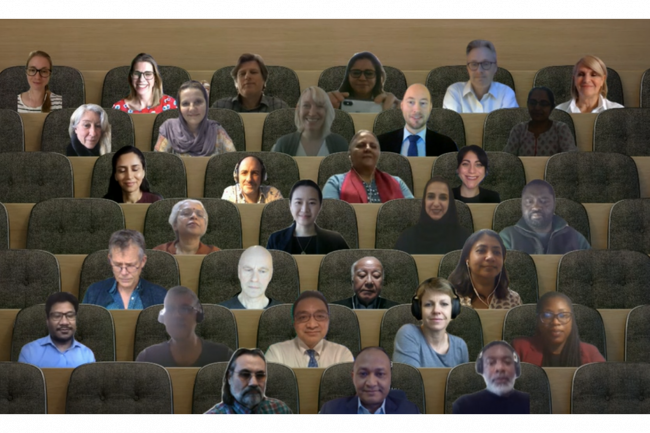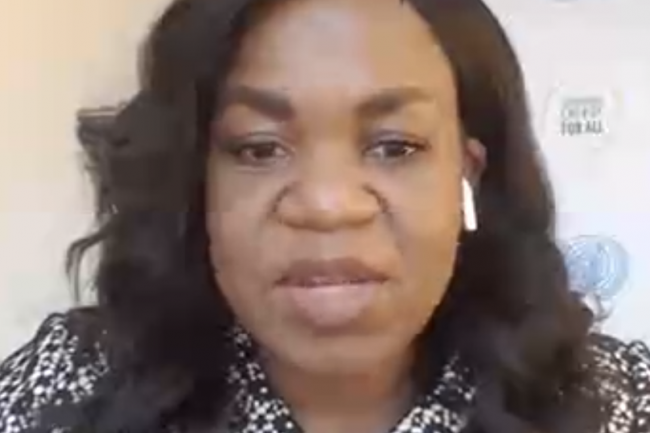The first meeting of the Technical Working Group on Enabling SDGs through Inclusive, Just Energy Transitions focused on how SDG 7 (affordable and clean energy) can help advance the other SDGs. Speakers stressed the need to focus on inclusion.
The Working Group is one of five groups that are preparing recommendations to be presented to the High-Level Dialogue on Energy, which will convene at the summit level in September 2021. This Working Group is being co-led by three UN entities: World Health Organization (WHO), UN Economic and Social Commission for Western Asia (ESCWA), and UN Department of Economic and Social Affairs (DESA).
Opening Statements
Damilola Ogunbiyi, Special Representative of the UN Secretary-General for Sustainable Energy for All, Co-Chair of UN-Energy, and Co-Chair of the High-level Dialogue on Energy, said being inclusive requires looking at challenges in a localized way. She recalled that many people worldwide lack electricity and access to clean cooking, which are critical to agriculture, food security, health outcomes, and gender outcomes.
Maria Neira, Director, Public Health, Environmental and Social Determinants of Health, World Health Organization (WHO), noted a forthcoming WHO report to UNFCCC COP 26 on ‘The Health Arguments for Climate Action,’ and called for discussing “healthy energy.” Neira said WHO will organize a high-level meeting on the Health and Energy Platform for Action in April 2021.
Minoru Takada, UN Department of Economic and Social Affairs (DESA), said the Working Group is unique in its focus on advancing the SDGs as a whole, not only the energy agenda. Recalling the 2019 edition of the Global Sustainable Development Report (GSDR), Takada said scientists from around the world recognized that advancing the energy agenda is an important strategy for achieving the SDGs.
Radia Sedaoui, Chief of Energy Section, UN Economic and Social Commission for Western Asia (ESCWA), said the Working Group has an opportunity to present a unique outcome: for the first time, sustainable energy could be considered as a human right, alongside the right to water.
With DESA serving as Secretariat of the High-level Dialogue on Energy, Takada presented an overview of the preparatory process. He said the process will develop the roadmap for reaching global energy goals. The recommendations will be considered at a thematic ministerial meeting co-hosted by Nauru, Panama, and the United Arab Emirates, who are global champions for this theme.
Open Discussion
“I long for a clean kitchen which is free of smoke, and for a life of peace free from torture and drudgery.”
“This sun has been here for generations but has now turned into a gold mine.”
Stories from women illustrating the effects of clean energy on their lives, presented by a TWG member
During the open discussion, members of the Thematic Working Group, the Global Champions for the theme, and organizations that are members of UN-Energy offered suggestions for the recommendations the Working Group will develop. Specific linkages that were highlighted for inclusion in the Working Group’s report were: Health (SDG 3); Education and job creation (SDGs 4 and 8); Gender equality and women’s empowerment (SDG 5); Ending poverty and reducing inequalities (SDGs 1 and 10); and Responsible consumption and production (SDG 12).
On the report structure and selection of SDGs linkages, one speaker said five interlinkages are too many for an “outcome-based approach.” Some suggested adding SDG 16 (peace, justice, and strong institutions), noting that energy is an imperative for those living under conflict and for maintaining peace and security. Another said UN peacekeeping operations are often among the largest energy consumers where they operate, and transitioning peacekeeping to clean energy could help the UN achieve its 80% renewable energy target by 2030.
Others highlighted the importance of linkages between SDG 7 and SDGs 13 (climate action), 14 (life below water), and 15 (life on land). Another said SDG 6 (clean water and sanitation) is as evident a link as SDGs 3 and 4 (health and education).
Some speakers preferred to use one or more central themes or umbrellas to cover several SDGs, such as inclusive growth, human wellbeing, provision of decent work and livelihoods, and planetary security. One participant endorsed the focus on a sub-set of SDGs but said the report must address the trade-offs and synergies related to those Goals.
Speakers also addressed the need for tools to foster action. Participants suggested that the report provide accessible tools and processes that can be replicated by people in different countries. One speaker called for specifying who will take action, saying that in an interconnected agenda, the responsibility to act can fall through the cracks.
Most participants highlighted inclusivity as a major emphasis, with many suggesting that the recommendations should focus on the needs of women and the poor – those who are most disadvantaged by a lack of access to energy – and ensure their inclusion. Some recommendations included building capacity for women working in the energy transition, strengthening clean cooking solutions, and ensuring that energy financing reaches the poor so people can start small businesses and ensure energy access. Speakers also highlighted that youth in the global south will be particularly involved in driving SDG 7.
One speaker reminded the group that the energy transition will have winners and losers. For example, more than 50 countries will have revenue shortfalls from the falling demand for oil and gas.
Another speaker called for building an economy of nurturance that puts gender and energy inclusion at the center, investing in green livelihoods that reduce carbon footprints rather than building new factories.
In addition to inclusive and just, participants said the energy transition must also be resilient and energy sources should be reliable.
The discussion also drew attention to:
- the need to reduce energy demand, which is not covered by the targets of SDG 12 (responsible consumption and production) and which goes beyond the scope of SDG target 7.2;
- the political nature of the energy transition – the challenges are not only technical;
- the need for decentralized and distributed systems, including solar sharing; and
- the importance of quantifying co-benefits and communicating about the energy transition in terms of the other SDGs, such as lives saved from reduced air pollution and new jobs created for women and youth.
Conclusion and Next Steps
Summarizing key messages from the discussion, Heather Adair-Rohani, WHO Team Leader on Household Energy and Health, said participants had emphasized inclusivity, in particular the need to account for vulnerable populations, fully engage youth, and make women an integral part of all aspects of the energy transition. She also observed that participants may wish to identify more interlinkages that originally suggested, and that case studies should illustrate impacts on multiple SDGs at once.
The co-leads of the Thematic Working Group on Enabling SDGs through Inclusive, Just Energy Transitions expect to circulate the first draft of the thematic report by 6 April. The second meeting will convene during the week of 12 April to consider the draft and matrix of actions. In late April, the five Thematic Working Groups will hold cross-cutting discussions to ensure coherence. A final meeting during the week of 17 May will serve to discuss and endorse the final version of the report and a matrix of actions.
The first meeting of the Technical Working Group on Enabling SDGs through Inclusive, Just Energy Transitions convened virtually on Thursday, 25 February 2021, from 8:00 to 10:00 am EST (GMT-5), with 63 participants.
To receive continuing coverage of this event delivered to your inbox, subscribe to the ENB Update newsletter.













